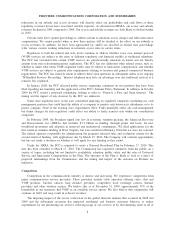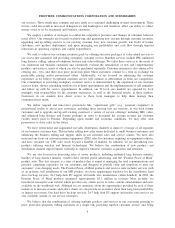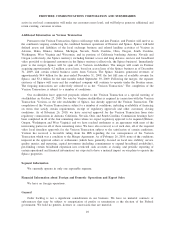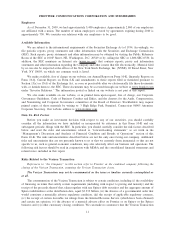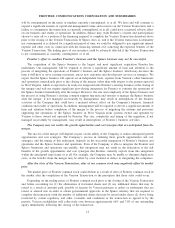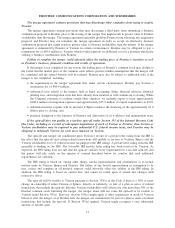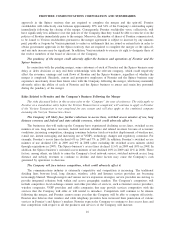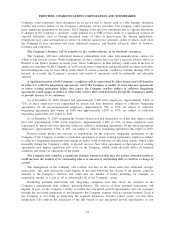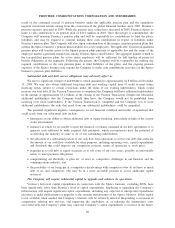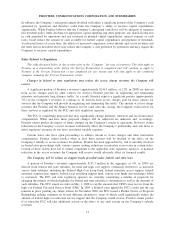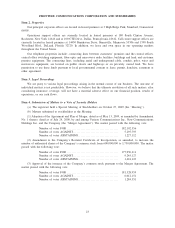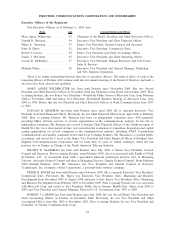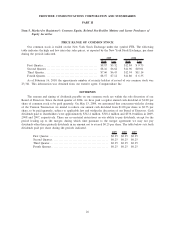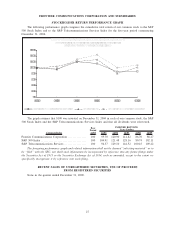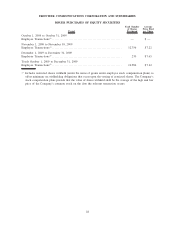Frontier Communications 2009 Annual Report Download - page 20
Download and view the complete annual report
Please find page 20 of the 2009 Frontier Communications annual report below. You can navigate through the pages in the report by either clicking on the pages listed below, or by using the keyword search tool below to find specific information within the annual report.Company could experience short disruptions in its service due to factors such as cable damage, inclement
weather and service failures of the Company’s third-party service providers. The Company could experience
more significant disruptions in the future. The Company could also face disruptions due to capacity limitations
if changes in the Company’s customers’ usage patterns for its HSI services result in a significant increase in
capacity utilization, such as through increased usage of video or peer-to-peer file sharing applications.
Disruptions may cause interruptions in service or reduced capacity for customers, either of which could cause
the Company to lose customers and incur additional expenses, and thereby adversely affect its business,
revenues and cash flows.
The Company’s business will be sensitive to the creditworthiness of its wholesale customers.
The Company will have substantial business relationships with other telecommunications carriers for
whom it will provide service. While bankruptcies of these carriers have not had a material adverse effect on
Frontier or the Spinco business in recent years, future bankruptcies in their industry could result in the loss of
significant customers by the Company, as well as more price competition and uncollectible accounts receivable.
Such bankruptcies may be more likely in the future if current economic conditions continue through 2010 or
beyond. As a result, the Company’s revenues and results of operations could be materially and adversely
affected.
A significant portion of the Company’s workforce will be represented by labor unions and will therefore
be subject to collective bargaining agreements, and if the Company is unable to enter into new agreements
or renew existing agreements before they expire, the Company workers subject to collective bargaining
agreements could engage in strikes or other labor actions that could materially disrupt the Company’s ability
to provide services to its customers.
As of December 31, 2009, Frontier had approximately 5,400 active employees. Approximately 2,800, or
52%, of these employees were represented by unions and were therefore subject to collective bargaining
agreements. Of the union-represented employees, approximately 750, or 27%, are subject to collective
bargaining agreements that expire in 2010 and approximately 1,200, or 43%, are subject to collective
bargaining agreements that expire in 2011.
As of December 31, 2009, assuming the Verizon Transaction had taken place as of that date, Spinco would
have had approximately 9,500 active employees. Approximately 6,800, or 72%, of these employees were
represented by unions and were therefore subject to collective bargaining agreements. Of the union-represented
employees, approximately 3,300, or 49%, are subject to collective bargaining agreements that expire in 2010.
Frontier cannot predict the outcome of negotiations for the collective bargaining agreements of the
Company. If the Company is unable to reach new agreements or renew existing agreements, employees subject
to collective bargaining agreements may engage in strikes, work slowdowns or other labor actions, which could
materially disrupt the Company’s ability to provide services. New labor agreements or the renewal of existing
agreements may impose significant new costs on the Company, which could adversely affect its financial
condition and results of operations in the future.
The Company may complete a significant strategic transaction that may not achieve intended results or
could increase the number of its outstanding shares or amount of outstanding debt or result in a change of
control.
The management of the Company will evaluate and may in the future enter into additional strategic
transactions. Any such transaction could happen at any time following the closing of the merger, could be
material to the Company’s business and could take any number of forms, including, for example, an
acquisition, merger or a sale of all or substantially all of the Company’s assets.
Evaluating potential transactions and integrating completed ones may divert the attention of the
Company’s management from ordinary operating matters. The success of these potential transactions will
depend, in part, on the Company’s ability to realize the anticipated growth opportunities and cost synergies
through the successful integration of the businesses the Company acquires with its existing business. Even if
the Company is successful in integrating the acquired businesses, Frontier cannot assure you that these
integrations will result in the realization of the full benefit of any anticipated growth opportunities or cost
18
FRONTIER COMMUNICATIONS CORPORATION AND SUBSIDIARIES


